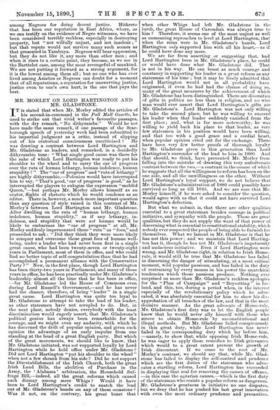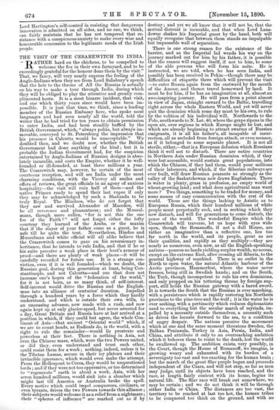MR. MORLEY ON LORD HARTINGTON AND MR. GLADSTONE.
IT is stated that when Mr. Morley edited the articles of his second-in-command in the Pall Mall Gazette, he used to strike out that vivid writer's favourite passages, with the dry remark, " No dithyrambs." Would he not have made the same remark, if one passage of the Scar- borough speech of yesterday week had been submitted to his impartial judgment as a critic, instead of slipping out of his oratorical consciousness uncriticised ? He was drawing a contrast between Lord Hartington and Mr. Gladstone as leaders, and remarked, in a decidedly dithyrambic tone: " What single good cause was there for the sake of which Lord Hartington was ready to put his shoulder to the wheel and to carry the car of progress over the ruts of human lethargy, human indolence, human stupidity ? " The "car of progress" and "ruts of lethargy" are highly dithyrambic,—Polonius would have interrupted him to say, "That's good, car of progress' is good," as he interrupted the players to eulogise the expression "mobled Queen,"—but perhaps Mr. Morley allows himself as an orator, flights of rhetoric which he would condemn as an editor. There is, however, a much more important question than any question of style raised in this contrast of Mr. Morley's between Lord Hartington and Mr. Gladstone. After dwelling on the ruts of "human lethargy, human indolence, human stupidity," as if any lethargy, in- dolence, and stupidity that were not human would be likely to embarrass the " car of progress " at all, Mr. Morley suddenly impersonated these " ruts " as " foes," and proceeded to ask : " Did they think they were more likely to conquer and overcome these great foes of human well- being, under a leader who had never been first in a single great cause, who had been twenty-seven or twenty-eight years in Parliament, most of them in office, and who could find no better topic of self-congratulation than that he had accomplished a permanent alliance with the Conservative Party ? " Now, in the first place, though Lord Hartington has been thirty-two years in Parliament, and many of those years in office, he has been practically under Mr. Gladstone's leadership almost all the time that he has been in office, —for Mr. Gladstone led the House of Commons even during Lord Russell's Government,—and he has never had the chance, therefore, of being " leader " in a single great cause. Lord Hartington was quite too loyal to Mr. Gladstone to attempt to take the lead of his leader, as other statesmen have not scrupled to do. But, in the next place, nobody denies, everybody with the least discrimination would eagerly assert, that Mr. Gladstone's political genius has always been remarkable for the courage, and we might even say audacity, with which he has discerned the drift of popular opinion, and given such opinion the advantage of an early impulse from one standing at the head of a great English party. But which of the great movements, we should like to know, that Mr. Gladstone initiated, was not supported loyally by Lord Hartington while he held office under Mr. Gladstone ? Did not Lord Hartington " put his shoulder to the wheel " when not a few shrank from his side ? Did he not support the Disestablishment of the Irish Church, both the great Irish Land Bills, the abolition of Purchase in the Army, the ' Alabama' arbitration, the Household Suf- frage Bill,—indeed, all the great reforms which caused such dismay among mere Whigs ? Would it have been to Lord. Hartington's credit to snatch the lead out of Mr. Gladstone's hands on any of these occasions ? Was it not, on the contrary, his great boast that when other Whigs had left Mr. Gladstone in the lurch, the great House of Cavendish was always true to him ? Therefore, it seems one of the most unjust as well as unmeaning reproaches to level at Lord Hartington, that when the reins were in Mr. Gladstone's hands, Lord Hartington only supported him with all his heart,—as if he could have done any more.
We are far from asserting or suggesting that, had Lord Hartington been in Mr. Gladstone's place, he could or would have done what Mr. Gladstone did. That is not in his way. He can boast as much courage and constancy in supporting his leader in a great reform as any statesman of his time ; but it may be freely admitted that Lord Hartington would not in all probability have originated, if even he had had the chance of doing so, many of the great measures by the achievement of which Mr. Gladstone has been distinguished. There are diversities of gifts in politics no less than in religion, and no wise man would ever assert that Lord Hartington's gifts are Mr. Gladstone's. Lord Hartington was not only willing to take the second place, but he was willing to succeed his leader when that leader suddenly vanished from the first place ; and, what is far more noteworthy, he was willing to yield back his place to that leader, as very few statesmen in his position would have been willing, and that too with a good grace and a cordial heart, when popular opinion cried out for the exchange. There have been very few better proofs of thorough loyalty to Mr. Gladstone given in this generation than Lord Hartington's surrender of the lead. to him in 1880. And that should, we think, have prevented Mr. Morley from falling into the mistake of drawing this very unfortunate contrast between the two,—a contrast in the course of which he suggests that all the willingness to reform has been on the one side, and all the unwillingness on the other. Without Lord Hartington's loyal support, we do not believe that Mr. Gladstone's administration of 1880 could possibly have survived so long as till 1885. And we are sure that Mr. Morley himself, if he were asked. to consider the question, would. agree with us that it could. not have survived Lord. Hartington's defection.
But what we submit is, that there are other qualities essential to a great statesman besides courage in political initiative, and sympathy with the people. These are great qualities, but they do not supply the want of that power of discerning what is essential to constitutional stability, which nobody ever suspected the people of being able to furnish for themselves. What we lament in Mr. Gladstone is that he has not this power ; and we maintain that Lord Harting- ton has it, though he has not Mr. Gladstone's impetuosity and audacious initiative. Even if Lord Hartington were wrong, and Mr. Gladstone right, in relation to Irish Home- rule, it would still be true that Mr. Gladstone has failed in discerning the danger of stimulating, at a most critical moment, wild popular passions, and has failed in the duty of restraining by every means in his power the anarchical tendencies which those passions produce. Nothing ever surprised us more than Mr. Gladstone's reckless apologies for the "Plan of Campaign" and " Boycotting " in Ire- land, and this, too, during a period when, in the interest especially of the revolutionary policy which he advo- cated, it was absolutely essential for him to show his dis- approbation of all breaches of the law, and that in the most decisive manner. As the great advocate of Home-rule, Mr. Gladstone's first duty was to let the English people know that he would. never ally himself with those who strove to obtain Home-rule by unconstitutional and illegal methods. But Mr. Gladstone failed conspicuously in this great duty, while Lord Hartington has never failed in the corresponding duty which lay before him, —namely, to show that, while opposing Irish Home-rule, he was eager to apply those remedies to Irish grievances which would to a great extent prevent the growth of Irish discontent. If we come to the root of Mr. Morley's contrast, we should say that, while Mr. Glad- stone has failed to display the self-control and prudence which are the first duties of the statesman who advo- cates a startling reform, Lord Hartington has succeeded in displaying that zeal for removing the causes of offence, —in this case the agrarian causes,—which is the first duty of the statesman who resists a popular reform as dangerous. Mr. Gladstone's greatness in initiative no one disputes, but we deny that he has pushed. his last great innovation with even the most ordinary prudence and precaution. Lord Hartington's Self-control in resisting that dangerous innovation is admitted on all sides, and no one, we think, can fairly maintain that he has not tempered that re- sistance with a conspicuous anxiety to make every wise and honourable concession to the legitimate needs of the Irish people.



















































 Previous page
Previous page